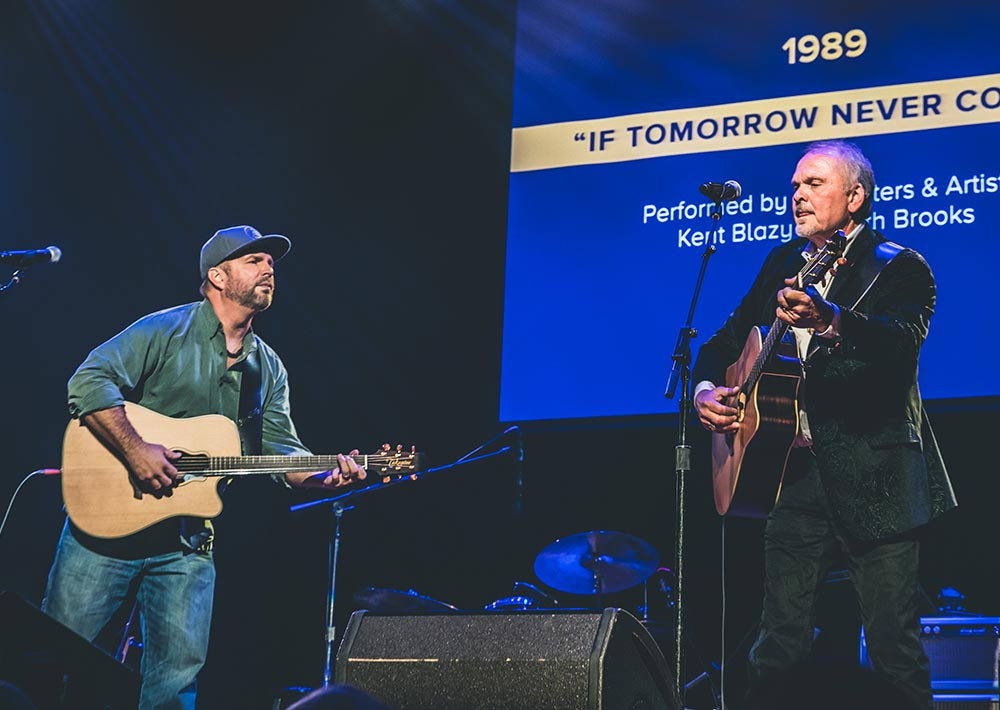 Kent Blazy. Photo: Moments By Moser Photography
Kent Blazy. Photo: Moments By Moser Photography
Kent Blazy, a celebrated figure in country music songwriting, recounts the unexpected journey of creating “If Tomorrow Never Comes,” a song that defied initial industry skepticism to become a global phenomenon. His collaboration with Garth Brooks, which began under humble circumstances, blossomed into a songwriting partnership that yielded numerous hits, but it’s their very first endeavor, “If Tomorrow Never Comes,” that remains deeply resonant with audiences worldwide. This is the story behind the song “If Tomorrow Never Comes.”
Kent Blazy, inducted into the Nashville Songwriter Hall of Fame in 2021, hails from Lexington, Kentucky, and his songwriting prowess has graced the discographies of country music luminaries like Garth Brooks, Gary Morris, Diamond Rio, and Patty Loveless. Beyond his songwriting achievements, Blazy’s own musical endeavors, such as his album For The Byrds with Steve Allen, showcase his enduring artistry. However, it is his partnership with Garth Brooks that cemented his place in music history, producing chart-topping singles and the unforgettable ballad, “If Tomorrow Never Comes.” This song, Garth Brooks’ inaugural No. 1 Hot Country hit, has been embraced by diverse artists, including Renato Russo, Ismael Miranda, Engelbert Humperdinck, and Ronan Keating, whose 2002 rendition topped the UK charts, demonstrating the song’s universal appeal.
The Genesis of a Hit Song: Kent Blazy and Garth Brooks’ Meeting
Blazy vividly recalls his first encounter with Garth Brooks, long before stadium tours and global stardom. “When I met Garth he was cleaning churches and selling boots,” Blazy recounts. Brooks’ initial ambition was to become a demo singer in Nashville, a common path for aspiring artists seeking to gain recognition. Blazy, who had established a demo studio to showcase his songwriting, was always on the lookout for exceptional vocalists. “In Nashville, if you sing like me, you find the best singer that you can to sing your songs in order to show the artist or the record label,” Blazy explains, highlighting the importance of demos in the music industry. His roster of demo singers at the time included future stars like Randy Travis, Martina McBride, Faith Hill, and Joe Diffie, all seeking their big break.
Garth Brooks saw demo singing as a more lucrative option than his current jobs and approached Blazy for an opportunity. After listening to Brooks’ cassette of original songs, Blazy recognized his talent and agreed to work with him. “I said, ‘I’ll start using you.’ And he said, ‘I write a little bit too.’ So we set up a writing appointment.” Brooks, still unknown and years away from becoming Garth Brooks, arrived with an idea that had been repeatedly rejected by other songwriters. “He came in and he said, ‘I’ve got this idea I’ve run by 25 writers and nobody liked it.’ I said, ‘Well, gee, thanks,’ and he said, ‘Well, don’t you want to hear it?’ And I said, ‘Well, yeah, play me what you got.’”
Overcoming Rejection: The Song’s Journey to Recognition
Brooks shared his initial concept for “If Tomorrow Never Comes,” an idea rooted in the sentiment Blazy’s mother often expressed: “Tell the people you love how you feel about them while they’re still alive.” However, Brooks’ original approach had a crucial flaw: “What was wrong with it was that he was killing somebody off in the first couple of lines of the song. It’s like killing off the star of the movie in the first three minutes. There’s nowhere to go.” Blazy recognized the potential in the core message but suggested a structural change to build emotional resonance.
 Kent Blazy and Garth Brooks performing at the NSAI 50th
Kent Blazy and Garth Brooks performing at the NSAI 50th
Garth Brooks (left) and Kent Blazy performing If Tomorrow Never Comes at the Nashville Songwriters Association International (NSAI) 50th anniversary celebration
“I just knew that the first verse had to bring people into the song by having this relationship going on, and then he could use what he had about losing people in his life as the second verse,” Blazy explains, detailing their collaborative refinement of the song. This shift broadened the song’s emotional scope, moving from a specific loss to a more universal reflection on love and mortality. “That gave a bigger depth to If Tomorrow Never Comes, because first you’re talking about your wife and then you’re talking about other people.” The revised structure resonated with both songwriters, and they knew they had created something special. Brooks recorded a simple guitar-vocal demo, capturing the raw emotion of “If Tomorrow Never Comes.”
Blazy was immediately impressed by Brooks’ maturity and songwriting depth, especially considering his young age. “I could not believe this kid that was 25-years-old had the depth to be able to come in and write the song. I’ve always kidded him that he was 25 going on 50.” Their creative synergy was instant, forging not only a successful songwriting partnership but also a lasting friendship, a rarity in the music industry. “Right from the beginning, we clicked and we became friends and we became co-writers. We’re still friends today, and that’s very unusual in the music business.”
The Bluebird Cafe Miracle: Turning Point for Garth and the Song
Despite the song’s quality and Brooks’ undeniable talent, initial industry response was discouraging. “We pitched it around town for about a year and nobody was interested in the song or in him,” Blazy recalls. Record labels and radio executives were hesitant, even expressing doubts about Brooks’ name. “They said, ‘No DJ is ever going to play a guy named Garth, can you imagine saying “Garth” on the radio?’”
However, fate intervened at Nashville’s legendary Bluebird Cafe. In a stroke of serendipity, Garth Brooks was asked to fill in for another artist who couldn’t perform. “One night, he got to play one song at the Bluebird Cafe. Another artist who was supposed to be there didn’t show up. So they called Garth and said, ‘Can you come in and sing one song?’” That one song was “If Tomorrow Never Comes.”
In the audience that night was Lynn Schultz from Capitol Records, who, ironically, had previously passed on signing Brooks multiple times. “Somebody from Capitol Records, who that week had passed on him for the third time, was in the audience to hear the other person.” Brooks’ performance of “If Tomorrow Never Comes” captivated Schultz, prompting a change of heart. “So Garth sang that song, and afterwards, the guy, Lynn Schultz, came up to him and said, ‘Well, maybe we missed something. Why don’t you come back in?’”
“If Tomorrow Never Comes” Becomes a No. 1 Hit
This Bluebird Cafe performance proved to be the pivotal moment. Capitol Records reconsidered and offered Garth Brooks a record deal. “So he went back in and they gave him a record deal. If Tomorrow Never Comes was his second single and his first [Hot Country] No 1,” Blazy states, emphasizing the song’s transformative impact. “Talk about the right place at the right time!”
The success of “If Tomorrow Never Comes” not only launched Garth Brooks’ career but also validated the song’s inherent power. Blazy reflects on the song’s universal appeal, “I think it’s just a universal idea that touches everybody who’s either lost somebody or loved somebody. It comes at it from a different angle, and Garth’s delivery on it is fantastic. All of that together makes it the song that it is.” He contrasts Brooks’ depth with contemporary trends in country music, “What you hear these days on the radio is 40-year-old country guys singing about spring break, and you go, ‘Come on now, you’re 40 years old, sing something deeper than that’. But Garth had that depth right from the beginning and he still does.”
Blazy also notes the unique dynamic of their first songwriting collaboration. “It goes against how the first songs usually go. But sometimes you can write the very best song with somebody for the first time because you have no preconceived notions on who they are and where it’s going to go. I think that’s kind of how it was with Garth.” He recognized Brooks’ exceptional talent early on, “Garth was so far ahead of most of the people in town. It shows in all the albums that he’s done and all the songs he’s created.”
Global Reach: Ronan Keating’s Version and International Acclaim
The enduring popularity of “If Tomorrow Never Comes” is further evidenced by its numerous covers, with Ronan Keating’s rendition achieving global success. “That so many other artists have recorded it is the highest compliment you can get,” Blazy acknowledges. He recounts his surprise at discovering Keating’s version while touring in Ireland with Garth Brooks. “I was over in Ireland doing a Garth tour in the early 2000s and people started telling me, ‘This guy, Ronan Keating’s cut your song.’ I didn’t have any idea who Ronan Keating was, because he wasn’t anybody in America.”
Keating’s version not only topped charts in Ireland and the UK but also became a worldwide hit, extending the song’s reach to new audiences and territories. “Then the next thing, ‘Ronan Keating’s No 1 in England!’ ‘Ronan Keating’s song just went to No 1 in Ireland.’” Blazy was deeply moved by the global embrace of “If Tomorrow Never Comes,” especially witnessing audiences in Ireland singing along to every word. “Then the other cool thing was going to Ireland and hearing the audience… they were singing every word to the song when he would just quit singing, and I’m thinking, ‘I’m in a foreign country and these people know my song.’ It was just so overwhelming and it still is.”
Enduring Legacy and Blazy’s Pride
To this day, “If Tomorrow Never Comes” holds a special place in Kent Blazy’s heart. “It still gets to me every time I hear it on the radio, or every time I play it. It just means more to me all the time. It’s a very special song.” For Blazy, “If Tomorrow Never Comes” represents the pinnacle of songwriting achievement. “It’s that song that I think a songwriter prays that they’ll write some day. A song that has a life of its own.” When asked about his favorite song, his answer is unwavering: “It’s gotta be that one.” The journey of “If Tomorrow Never Comes,” from a rejected idea to a global anthem, is a testament to the enduring power of heartfelt songwriting and the magic that can happen when two talented individuals collaborate.
